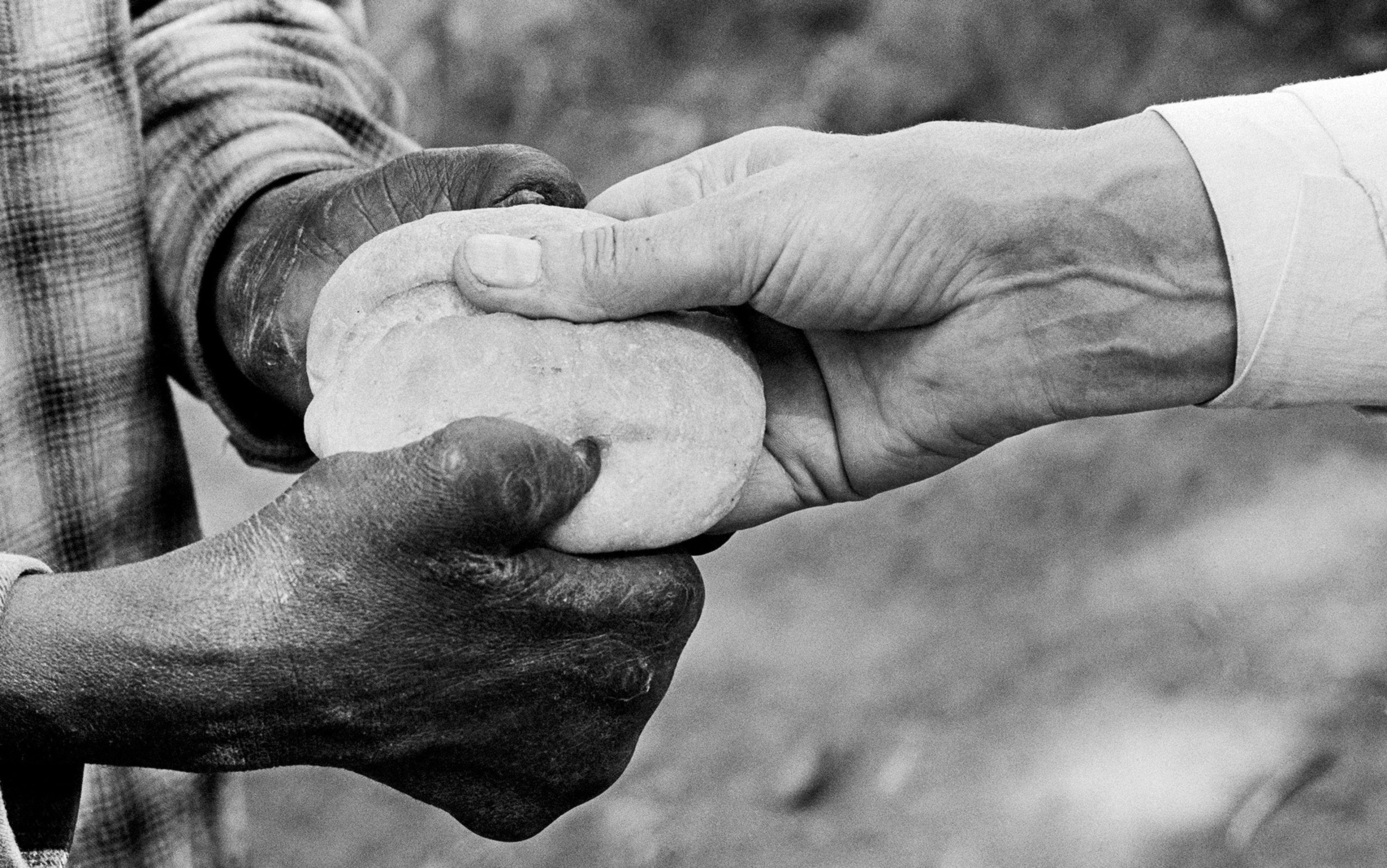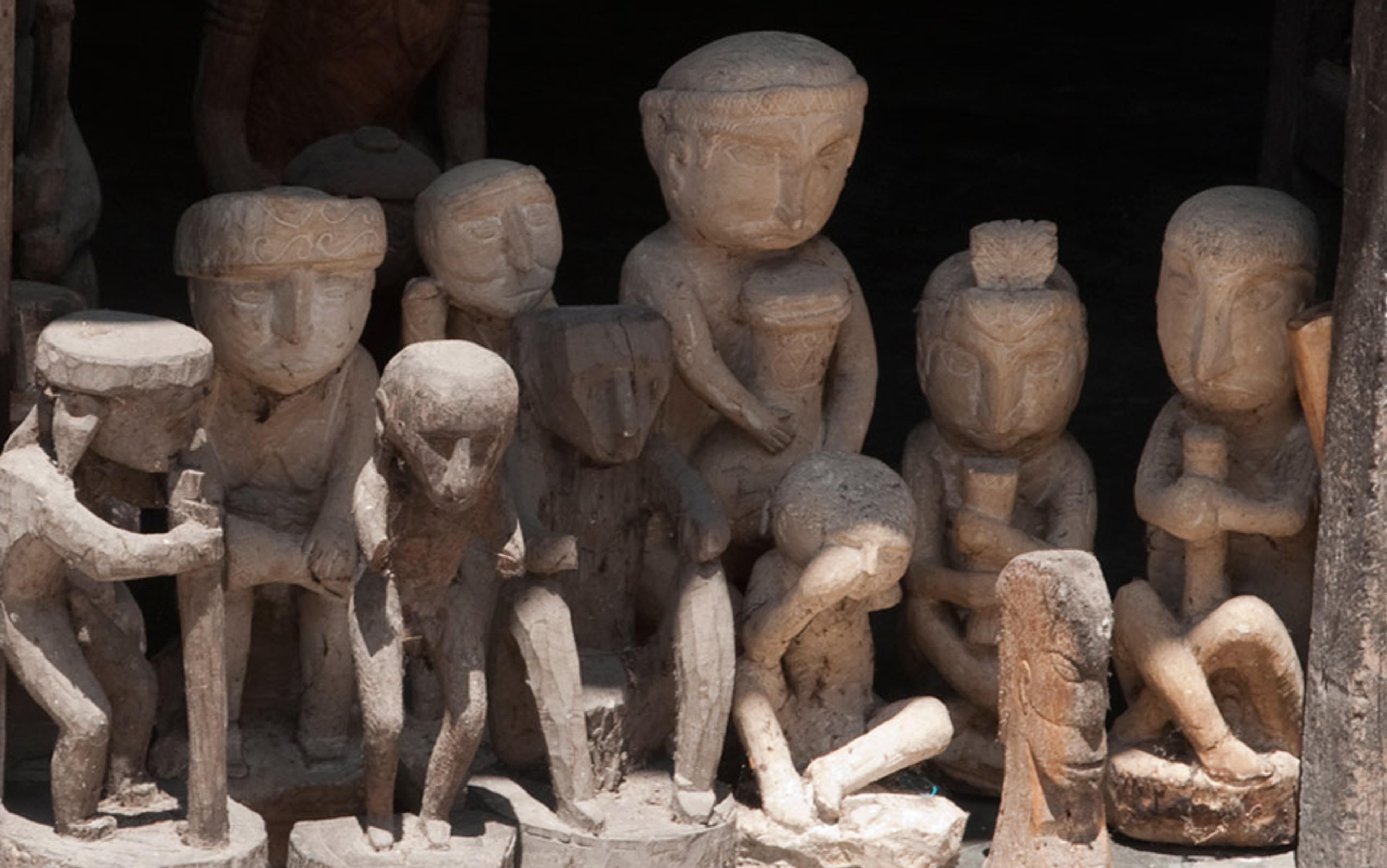‘To receive from kings,’ the Mahabharata tells us, ‘is at first honey, at the end, poison.’ Honey because who doesn’t want the gift of a king’s riches? Poison because how will we ever repay? We all know, because it is written by our sages and scripted in our norms, that receiving a gift carries with it certain obligations: to say thank you and to reciprocate with a gift in return. ‘These people invited us for dinner,’ Elaine Benes explains to George Costanza on the TV show Seinfeld. ‘We have to bring something.’ But why, George asks? ‘I just don’t like the idea that, every time there’s a dinner invitation, there’s this annoying little chore that goes along with it,’ he complains. ‘The fabric of society is very complex, George,’ Jerry Seinfeld tells him.
The show about nothing is, among other things, a keen study of the gift. After all, we have Seinfeld (1989-98) to thank for the verb ‘to regift’, coined in episode 98, ‘The Label Maker’, when a free gift sets in motion a series of trades. Tim Whatley, the dentist played by Bryan Cranston, doesn’t charge Elaine for dental work. To reciprocate, Elaine gifts him a label maker. A few months later, Jerry gives Tim Super Bowl tickets. Tim reciprocates by regifting the label maker that he received from Elaine. Jerry wants the Super Bowl tickets back. ‘If he can regift,’ George asks, ‘why can’t you degift?’
We might ask, with George, why? Why can’t we show up to dinner empty handed? Why should the gift of free dental work be repaid in the generosity of a label maker? What hidden law directs the label maker in one direction and the Super Bowl tickets in another? Why can’t Jerry reverse the flow of traffic? Why can he regift, but not degift? And why do we pretend that all of this is voluntary when so much of it is obligatory? Why do we say that we give and reciprocate gifts out of kindness and not, the more likely scenario, out of fear of censure? The fabric of society is very complex.
Close to a century ago, the French sociologist Marcel Mauss set out to answer just these questions. In his seminal essay The Gift (1925), a now classic text in the discipline of anthropology, he surveyed a range of gift-giving practices, and wondered: why do we feel compelled to reciprocate gifts? ‘The Label Maker’ could easily have featured among his sources. Mauss was the nephew of Émile Durkheim, the founder of the modern discipline of sociology. Born in 1872 in the town of Épinal in the northeast of France to a family of rabbis and observant Jews, Mauss himself stopped practising Judaism early on (his mother wrote to him once he had left the house: ‘If you wanted to please me, you’d observe Passover the best you can. It begins tomorrow evening’). At 18, he entered university with the intention of studying philosophy. His interests soon gravitated toward the comparative study of religion, an emerging field fed by the growing body of colonial, ethnographic sources documenting non-European cultures. Mauss is far less well known than his uncle in part because he published mainly essays and reviews, rather than books. But The Gift, one of his longer essays, has enjoyed an enduring afterlife, inspiring the sub-field of economic anthropology.
The starting point for the essay was an observation. Texts from around the world – the Norse Edda, the Hindu Vedas, reports of potlatches in the Pacific Northwest – pointed to evidence of economic practices that resisted easy definition. These were practices that appeared, from one angle, to be inspired by the generosity and selflessness that we associate with gift exchange: a political leader hosts a lavish meal; presents are showered upon a couple ahead of their child’s birth; friends are asked to share in the gains of a successful hunt. And yet, not only could these friendly exchanges turn hostile – camaraderie giving way to competition, alliance to war – but no act was singular. Each deed seemed to demand a reciprocal gesture: every gift was met, at some point down the road, with a return gift. One gave, it followed, with some expectation of receiving in return. In this way, transactions that seemed selfless were also self-interested. Exchanges that appeared voluntary were also, at some level, obligatory. A loan had to be repaid, an invitation reciprocated, a kindness outdone (‘The round of drinks,’ Mauss observed, in W D Halls’s translation, ‘is ever dearer and larger in size’).
Seen this way, gift giving started to look an awful lot like an economic transaction. And yet – and this is what struck Mauss, as it should strike us – everything in our language and our laws would have us believe that the gift and the contract are of a different species. The one motivated by goodness, the other by utility; the first rooted in moral law, the second in material interest; the burden of a tax as against the sweetness of charity. The calculated ends of the banker shares little, we like to think, with the hallowed heart of the almsgiver. Yet, the force of ethnographic evidence was such that it made this way of thinking seem quite strange, a historical anomaly with roots in the recent European past.
The contract was the solution to a problem unique to modern commercial society: that we depend on strangers to provide us with life’s necessities. The caricature of self-sufficient Homo economicus obscures this basic feature of Adam Smith’s diagnosis. We have to trade because neither our labour nor our endowment alone can supply us with everything we need. The modern condition is one of dependence, not independence. ‘[M]an has almost constant occasion for the help of his brethren,’ Smith wrote. Part of the problem, though, is that we can hardly be friends with the great many on whom we depend. Our time is limited. The supply chain is long. The contract steps in where fellow feeling falls short. We needn’t worry whether our trade partner is trustworthy, whether his word is good or his motives pure. The law of contract, enforced by the state, secures the terms of exchange. Matters of the heart – friendship, love, sentiment – needn’t intrude. Better left to the realm of personal relations or the domestic sphere.
Smith’s book An Inquiry into the Nature and Causes of the Wealth of Nations (1776) rationalised this arrangement by insisting that the earliest trade relations anticipated the logic of the contract. The effect was to make the regime of contract, and the world of market exchange it enshrined, seem natural rather than the product of human choice and political will. This was to mask prescription, what we ought to do, with description, what is. Before money or a state to mint it entered the picture, the story went, barter was the order of the day. Exchange entailed a strict calculation of interest. As Smith would have it: ‘Give me that which I want, and you shall have this which you want.’
We need things from others, both spiritual and material, just as they need from us
In Mauss’s time, exchange practices documented around the world and in the deeper past flew in the face of this received wisdom. Trades were inexact, open-ended, and had everything to do with personal and communal relationships. They strengthened friendships, guaranteed allies, maintained tradition. The movement of material goods served a variety of immaterial purposes that the language of cold-hearted utility failed to fully capture. Love and self-interest were not so readily distinguished.
As in The Wealth of Nations – indeed, as in any good work of social theory – Mauss’s descriptive project couched prescriptive ends. Read at the descriptive level, his essay simply offered an account of gift-giving practices. Ultimately, though, his goal was to encourage readers to rethink economic exchange – to convince us, that is, that we need not be creatures of Smith’s invention. Mauss approached this goal by, in a sense, taking us through the backdoor. In showing us practices that looked like gift exchange but turned out to be a form of economic contract, he chipped away at the division between the two. His point was not to make us cynical about gifts, but to suggest that economic exchange might retain something of the spirit of gift giving. His point was not to expose charitable giving as a thinly concealed tax dodge, honourable language only giving cover to crasser motives, but to ask what might happen if we brought to the yearly ritual of tax payment the jubilance of holiday gift exchange. What would happen if we saw tax disbursement not as an onerous obligation but as a welcome investment in the life we inevitably share? Would we discover or rediscover, as Mauss would have it, ‘the joy of public giving; the pleasure in generous expenditure on the arts, in hospitality, and in the private and public festival’?
One effect of the contract-gift split was that it divorced something like care, the feeling we extend to our loved ones and the reason we delight in sharing with them gifts, from the world of day-to-day market exchange. We outsource any worry over the fairness of exchange to the law of the contract where all that counts, from a moral perspective, is that the parties have consented to the arrangement. And, once we fulfil our end of the bargain, the contract absolves us of any further obligation to our trading partner. Strangers we were, and strangers we remain. Gift exchange, by contrast, traffics in no such finality. Once caught in a cycle of gifts and counter-gifts, our obligations never formally expire. Only death or a breakup or the slower, less perceptible fraying of a relation, two friends grown apart with the years, can put an end to the transaction. A blessing and a curse.
In dissolving the line separating gifts from contracts, Mauss invited us to reimagine the relations governing everything from the workplace to domestic life. At the time he was writing in the 1920s, the French parliament debated the expansion of social insurance provisions. To Mauss’s mind, the passage of such legislation required us to see the logic of the gift at work. We had to see that the worker who had given their life to a job was owed the insurance of life in return – security against disability, sickness and old age. Wages alone wouldn’t settle this debt. Were we to enrich labour relations with broader duties of care, we might, conversely, entertain the possibility that care relations, the duties of parental and reproductive work, ought to be compensated as labour. At the very least we might agree that the state or employer owed greater assistance to workers with families.
The Gift also lent more fundamental lessons. We don’t typically like to think of personal relationships as transactions. To speak this way would seem to cheapen our ties, importing the profane language of the contract where it plainly doesn’t belong – a sign, surely, of the creeping influence of the market and its mentality, its power to pervert even the most sacred of human interactions. But maybe we’ve got it the wrong way around. What Mauss would say is that it’s the dominance of this one, impoverished way of thinking about exchange that has cheapened what it means to enter into trade relations. The contract has given exchange a bad name. In another context, we would see that social life is nothing other than an extended transaction. This is not a bad thing. It’s what makes the weight of life’s uncertainties bearable. We need things from others, both spiritual and material, just as they need from us. We spend our time together racking up credits and incurring debts: lending an ear, giving a hand, sharing our blessings, calling in favours. Installed in interlocking networks of obligation, we know we’re not alone. When disaster strikes, the tab is open. The counter-gift is on its way.
Mauss’s essay has always presented readers with a puzzle. What begins as a relatively straightforward claim takes flight into more mystical reasoning. The first part is clear: gifts are not unlike contracts because they compel a return payment. But Mauss doesn’t end the story there. Dissolving the line between the gift and the contract would seem to require him to explain what it is that allows gift giving to take on the character of the contract. He moves on to tackle a less obvious question: in those societies in which gifts look more like contracts, what is it exactly about the gift that necessitates a return payment? Why must the gift received be reciprocated?
In the first instance, Mauss identifies an answer to this question in Māori philosophy. Gifts, he says, are invested with a spiritual quality, called hau in Māori. Because an object you give me is invested with this quality, I am compelled to circulate the wealth that object bestows, to give you something in return. Hau is not easy to translate. It can mean the life force animating people, objects or places. In this way, it’s like a soul, if soul didn’t have the more limited association with the human that it does in English (‘In English,’ Robin Wall Kimmerer writes, ‘you are either a human or a thing’). This has left interpreters to argue over what Mauss was trying to say. Did he mean to suggest that the gift has a soul, a personality? And that this thing-person circulates because it desires to return to its original owner? Or was he saying that the gift is animated by the soul of the giver? On this reading, when I give you a gift, I give you a part of myself. Because that part of myself needs to return to me, you feel compelled to give me something in return. But this doesn’t entirely make sense. If what I gave you was part of myself, why would something else, something not part of me, complete the trade?
To be a person is to be constituted, in part, by the things one has given or received
Is it the spirit of the gift or the spirit of the giver that compels a return payment? Mauss teases both. ‘Things sold still have a soul,’ he writes. ‘They are still followed around by their former owner, and they follow him also.’ The first clause suggests that ‘soul’ refers to the person, the former owner. The second clause, by contrast, places the agency on the things: they follow him. For the most part, scholars focus on the latter reading, emphasising that Mauss wants mainly to make us think differently about things. To think of an object as animate or person-like is to insist, perhaps, that objects can never be fully or exclusively owned. Wealth must circulate. But in saying, as Mauss does (in Ian Cunnison’s translation), that ‘things have personality’, Mauss asks us not only to see things in a new light, but to revise how we think about personhood. ‘[T]he thing received is not inactive,’ he explains (in Halls’s translation). ‘Even when it has been abandoned by the giver, it still possesses something of him.’ The thing is animated by the giver, a person. But this also means that to be a person is to be constituted, in part, by the things one has given or received, the things one owes or is owed. The thing given ‘forms a part of him’ (Cunnison). Mauss cites a Kwakiutl tale in which a chief, upon accepting objects that are said to attract wealth, sings: ‘My name will be “property making its way towards me”.’ The objects, the name and the property that flow to him by virtue of his standing form part of the same entity, the same person.
On 12 June 2020, the Democratic Republic of Congo-born activist Emery Mwazulu Diyabanza staged a protest at the Musée du quai Branly – Jacques Chirac in Paris. Appearing before a smartphone camera that broadcast the action live, Diyabanza announced: ‘I have come here to recuperate the goods that belong to me.’ He then approached an open display case where he wrested a wooden, 19th-century funerary pole free from its stand. For 33 minutes he paraded the object through the cavernous halls of the museum as he explained to onlookers: ‘We are leaving with our property, we are bringing it home.’ France holds some 90,000 artefacts of sub-Saharan African provenance in its museums. The majority of them – 70,000 – are housed in the Musée du quai Branly.
In his lifetime, Mauss was responsible for training a generation of social scientists to carry out the first fieldwork expeditions in French colonies. He placed heavy emphasis on the collection of ethnographic artefacts. ‘[O]bjects are proof of social facts,’ he told his class (his student Michel Leiris lamented from the field: ‘The whole day is spent collecting objects, classifying them, recording them, packing them away. I feel much more like an accountant than an adventurer’). In the decade after he published The Gift, several thousand African artefacts were deposited in Paris – and later transferred to the Musée du quai Branly when it opened in 2006. In the French context, invoking Mauss’s essay in response to questions of restitution is less the happy application of theory to practice than a return to origins.
Arrested on charges of attempted robbery, Diyabanza stood for trial later that year. His lawyers defended the action as a political protest rather than an attempted theft. They invoked, as precedent, the 2014 acquittal of a member of a feminist group, who was charged with sexual exhibition for baring her chest and attacking a wax statue of Vladimir Putin. The lawyer representing the Musée du quai Branly conceded that while ‘a crime of bodily expression, such as sexual exhibition, can be justified by freedom of expression, it is neither possible nor desirable that freedom of expression can legitimise crimes of this type of theft.’ Several weeks later the court rendered its judgment: Diyabanza was ordered to pay a 1,000 euro fine.
Social life is nothing other than an unending trade of goods and favours, of food and feasts and label makers
A man walks into a museum and removes an object that is said to have, at one time, belonged to his ancestors. Of all the ways to name this act – protest, retrieval, theft – ‘crime of bodily expression’ may strike us as the least plausible. For one, the body in question (the man’s) implicates a second body (the object). The right to bodily or self-expression – to speak, write, protest, or worship – surely ends where one body ends and another begins. We could, though, draw new borders. ‘In its widest possible sense,’ the philosopher William James wrote in 1890, ‘a man’s Self is the sum total of all that he CAN call his.’ (Italics in the original.) For James, this included the man’s body, his ‘psychic powers’, clothes, house, wife, children, reputation, friends, land, horses, yacht, bank account, and ancestors. What about ancestral possessions?
If, for James, a man’s self is ‘the sum total of all that he CAN call his’, Mauss’s reply might have been that a man’s self is the balance of his social debts. This was different than James’s notion of a self that includes one’s bank account. More than an assessment of what a man could claim as his in a strict legal or monetary sense, it required us to see the full gamut of social, cultural and historical forces responsible for shaping us as individuals. It’s no coincidence that, in the years after he wrote The Gift, Mauss went on to publish a series of articles about the construction of the self. His essay ‘Techniques of the Body’ (1935) considered the ways that even the most unremarkable and often unconscious individual behaviours – styles of walking, jumping, sleeping, swimming – were produced by one’s cultural context. He called on social scientists to bring together insights from biology, psychology and sociology to study what he called the ‘total human being’, the individual at the nexus of complex patterns and drives. ‘[E]verything mingles here,’ he wrote, ‘body, soul, and society.’
In The Gift, the claim about personhood, though less overt, was also more specific. Cycles of giving and receiving, the essay suggests, carve out the self. We are what we have lost and gained. This is the missing piece in the interpretive puzzle. To move beyond the contract, Mauss suggests, we need a new model of personhood: not the self-contained, autonomous individual, but the person as implicated in a web of exchange. Gifts must be repaid not, or at least not only, because of a spiritual quality resident in objects, but because social life is nothing other than an unending trade of goods and favours, of food and feasts and label makers. This means that, at any given moment, we confront each other, inescapably, under these conditions: as creditor or as debtor. We are givers and takers – bloated by our gains, hollowed by our losses, formed by our inheritance. Entitlement scripts the movement of bodies through space.
In Atlantics, the 2019 film by Mati Diop, which won the Grand Prix at the Cannes film festival, a group of young construction workers in Dakar set sail for Europe after being cheated out of their pay. Their boat capsizes, and they never make it. Back in Senegal, the workers’ girlfriends awake for nightly sleepwalks, their bodies possessed by the spirit of their deceased lovers. Zombie-like, they appear before their boyfriends’ boss to demand the unpaid wages. Whether or not debts can be paid to a ghost, the body knows the score.






